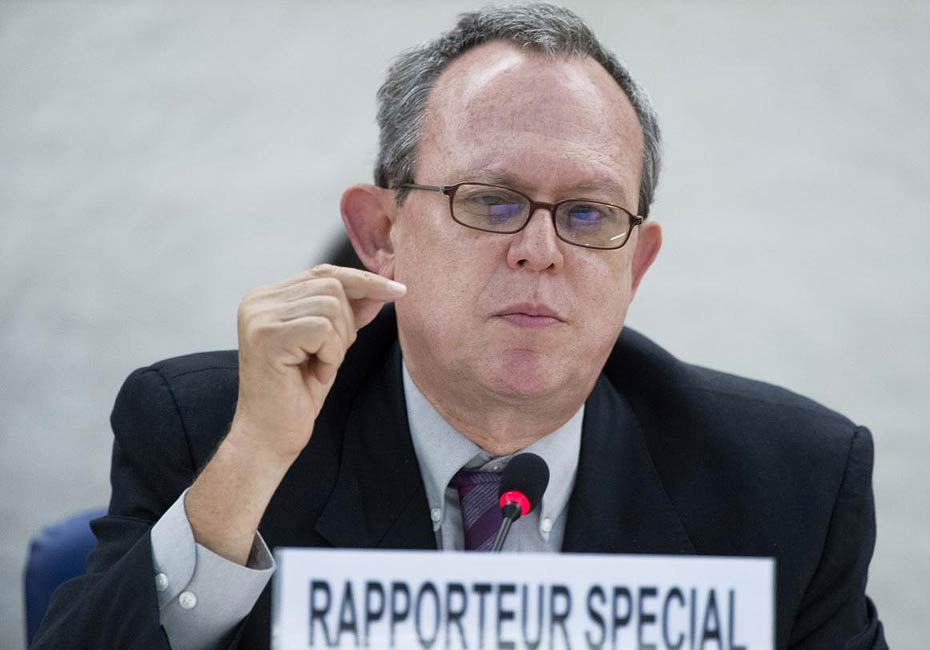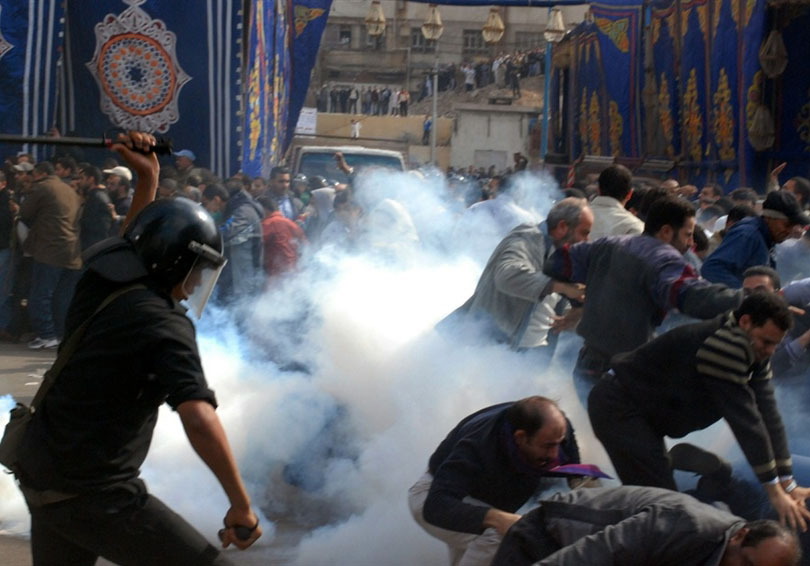
Aug 5, 2013 | News
La CIJ condena acciones de intimidación en contra del Relator de las Naciones Unidas sobre Libertad de Expresión y del Instituto Centroamericano de Estudios para la Democracia Social (DEMOS).

Jul 29, 2013 | News
The ICJ today called on the Egyptian authorities to put an end to its use of unlawful and lethal force as it pursues an excessive and violent crackdown on protesters.
The ICJ also called on the authorities to promptly, impartially and fully investigate the allegedly unlawful killings of more than 80 people who were reportedly fired on by security forces in a rally in Cairo in support of ousted President Mohamed Morsi on 27 July.
Large-scale rallies were held when the head of the armed forces, General Abdel Fattah El Sisi, called on citizens to grant the military a mandate to fight “terrorism and violence”.
The ICJ is also concerned at reports indicating that the government may be poised to grant arrest powers to the Egyptian Armed Forces.
“The Egyptian authorities must promptly, fully, and impartially investigate the actions of the security of forces, involving alleged unlawful killings and ill-treatment of protesters with a view to holding accountable those responsible,” said Wilder Tayler, ICJ Secretary General. “The authorities must also ensure that, in accordance with international law and standards, security officers exercise force only in a proportionate manner and may use lethal force only when strictly unavoidable to protect lives.”
Since the unlawful seizure of power by the Army and the ouster of President Morsi, more than 130 persons said to be supporters of the former President have reportedly been killed as a result of the unlawful and disproportionate use of force by security forces, including firing with live ammunition.
The ICJ is concerned that the ongoing attacks on protesters, and the impunity that continues to prevail over them, will further contribute to the deterioration of the rule of law and the human rights situation in Egypt.
To prevent such deterioration, the Egyptian Army must carry out its security functions so as to protect the enjoyment and legitimate exercise of human rights by all. It must also ensure a quick and steady transition of power to a legally constituted civilian authority.
Contact:
Said Benarbia, ICJ Senior Legal Adviser of the Middle East and North Africa Programme, tel: 41 22 979 38 17, e-mail: said.benarbia(a)icj.org
Photo by Samaa TV

Apr 20, 2013 | Advocacy, News, Non-legal submissions
The ICJ today condemned the execution by the Government of Taiwan of six prisoners, convicted on charges of murder, on 19 April 2013. It follows the earlier execution of six convicted persons in December 2012.
Twenty-one executions have been carried out in Taiwan since April 2010, shattering a de facto moratorium of the death penalty that had been respected by the Government since December 2005.
“The Government of Taiwan’s execution of 12 people in the last six months constitutes a serious and unacceptable assault on the right to life and human dignity”, said Alex Conte, Director of the ICJ International Law & Protection Programmes. “These executions also place Taiwan at odds with the international community, which has adopted with increasingly large majorities since December 2007 the UN General Assembly resolutions calling for a worldwide moratorium on executions”, Conte added.
This new round of executions are especially lamentable in light of the encouraging step recently taken by the country to invite an international group of experts to review the measures adopted by the Government to promote and protect human rights. The recommendations to the Government of Taiwan, formulated by those experts, and welcomed by the ICJ and other rights groups, included intensifying efforts towards the abolition of capital punishment and the recommendation that Taiwan “as a first and decisive step, immediately introduces a moratorium on executions in accordance with the respective resolutions of the UN General Assembly”.
The ICJ believes that the use of the death penalty constitutes a violation of the right to life and the right not to be subjected to cruel, inhuman or degrading punishment.
ICJ and other rights groups encourage Taiwan on domestic implementation of human rights (see ICJ and other rights groups’ statement on Taiwan’s human rights review process)

Mar 22, 2013 | News
Indonesia’s resumption of the death penalty after a four-year moratorium is a major setback for the country’s human rights record, the ICJ said today.
Indonesia executed Adami Wilson Bin Adam on 15 March 2013. After the execution, Indonesia’s Attorney General Basrief Arief announced that the government was set to execute nine more convicts this year.
“The Indonesian government should immediately reverse its decision to proceed with more executions in defiance of global trends toward the abolition of the death penalty,” said Emerlynne Gil, ICJ’s International Legal Advisor for Southeast Asia in Bangkok. “At least 150 countries have now either abolished the death penalty or instituted an official or unofficial moratorium. There is a growing understanding around the world that the death penalty is an unacceptable assault on rights and dignity.”
Adami Wilson Bin Adam was convicted in 2004 for smuggling one kilogram of heroin into the country. In Indonesia, the law prescribes the penalty of death for trafficking narcotics.
During its Universal Periodic Review (UPR) in 2012 at the UN Human Rights Council, Indonesia rejected recommendations to abolish the death penalty or establish a moratorium on executions.
In its reply, the Government of Indonesia said that death penalty is imposed “selectively only for serious crimes.” However, the UN Special Rapporteur on extrajudicial, summary or arbitrary executions, in his report, emphasized that “the death penalty should be eliminated for crimes such as economic crimes and drug-related offences.”
Indonesia last carried out executions four years ago. In 2008 it executed three men convicted of the 2002 Bali bombings.
“This execution undermines Indonesia’s repeated efforts to position itself as a regional human rights leader,” Gil added. “Its resumption of executions is indeed a very grave setback not only for Indonesia, but also for the region and ASEAN, the Association of South East Asia Nations.”
The ICJ says that use of the death penalty violates the right to life and the right not to be subjected to cruel, inhuman, or degrading treatment or punishment.
Last November 2012, the UN General Assembly issued a resolution calling on all Member States to establish a moratorium on executions with a view to abolishing the death penalty.
The resolution was adopted by an overwhelming number of votes from Member States. Indonesia abstained from the vote.
The ICJ calls Indonesia to immediately ratify the 2nd Optional Protocol to the International Covenant on Civil and Political Rights, which obligates State Parties to take all necessary measures to abolish the death penalty.
In the immediate term, the country should implement a moratorium on the practice, the ICJ adds.

Mar 22, 2013 | News
The ICJ, the World Organisation Against Torture (OMCT) and Geneva for Human Rights are encouraged by steps taken by Taiwan to review compliance with human rights and urge further steps towards the realization of rights on the ground.
Due to the fact that the territory of Taiwan is not recognized by the international community as a sovereign State, Taiwan is not a member of the United Nations.
As such, the UN HUman Rights Committee and Committee on Economic, Social and Cultural Rights have been unable to review Taiwan’s implementation of the International Covenant on Civil and Political Rights and the International Covenant on Economic, Social and Cultural Rights, in respect of which Taiwan has enacted incorporating legislation.
Notwithstanding this position, the Government of Taiwan has facilitated a parallel review by independent experts of implementation of these instruments.
This review was conducted on 25-27 February 2013, leading to the adoption by the independent experts of concluding observations and recommendations.
The ICJ, OMCT and Geneva for Human Rights are encouraged by the steps taken.
They urge the Government of Taiwan to undertake prompt and effective steps towards implementation of the recommendations of the independent experts by means that involve a constructive dialogue with civil society, including as this pertains to the abolition of the death penalty.
They also call on the Government to take similar steps for incorporation of human rights standards set out in other universal treaties, including the Convention against Torture.
Taiwan-ICCPR-ICESCR-Conclusions-IndependentExperts-2013 (download concluding observations of the independent experts)









